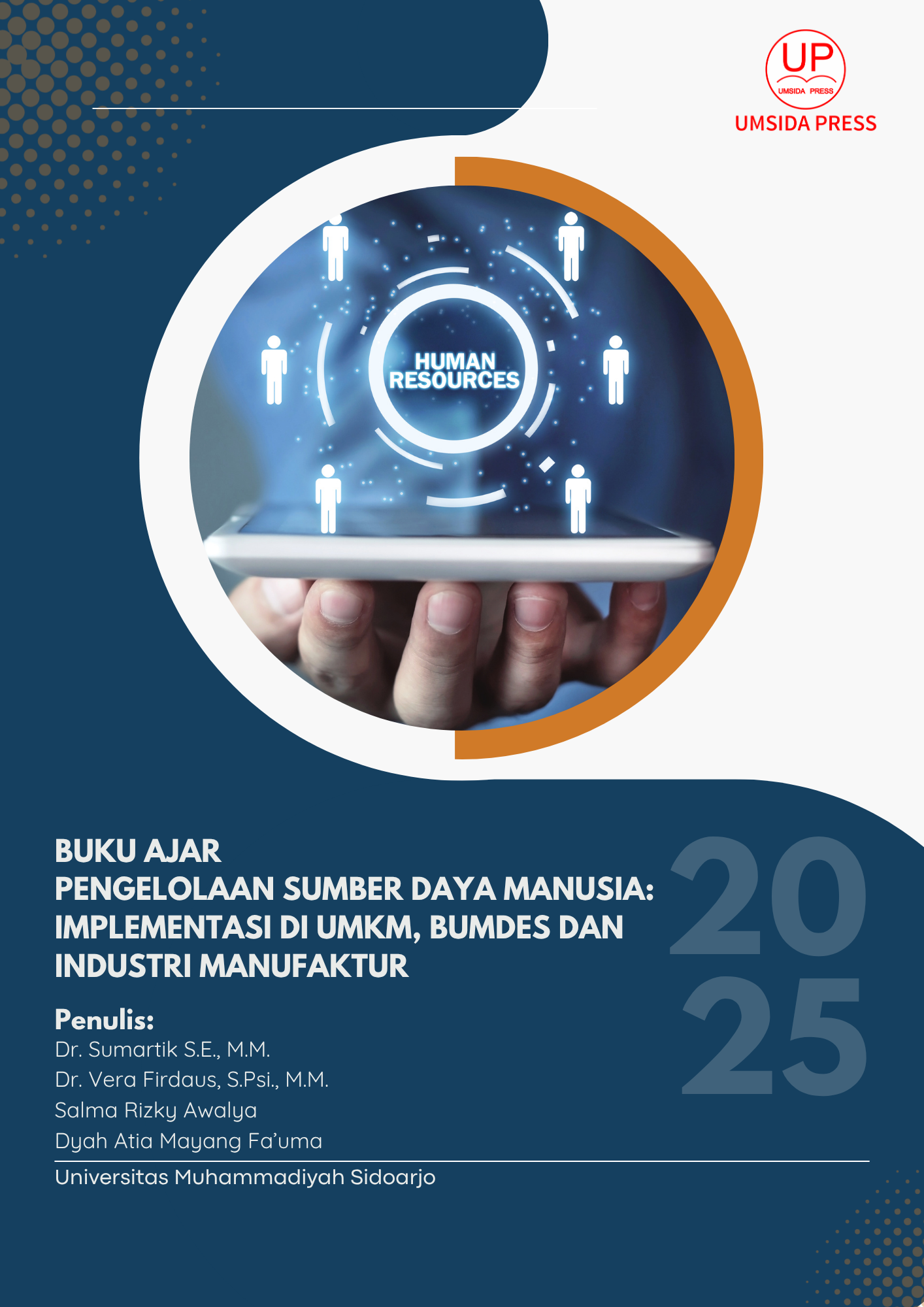Buku Ajar Pengelolaan Sumber Daya Manusia: Implementasi Di Umkm, Bumdes Dan Industri Manufaktur
Keywords:
Pengelolaan Sumber Daya Manusia, Manajemen SDM, Buku Ajar SDM, UMKMAbstract
Judul : Buku Ajar Pengelolaan Sumber Daya Manusia: Implementasi Di Umkm, Bumdes Dan Industri Manufaktur
- BAB 1 PENGANTAR: MANAJEMEN SDM DALAM ERA INDUSTRIALISASI
- BAB 2 KONSEP TEORITIS DAN METODE PENGELOLAAN SDM
- BAB 3 GREEN HRM
- BAB 4 MANAJEMEN PELATIHAN DAN PENGEMBANGAN SDM
- BAB 5 PERILAKU ORGANISASI
Editor: M.Tanzil Multazam
Published by:
Universitas Muhammadiyah Sidoarjo Press, Sidoarjo, 2025
ISBN:
- ISBN :
Deskripsi :
Buku ini membahas secara komprehensif konsep, prinsip, dan praktik pengelolaan sumber daya manusia (SDM) dalam berbagai konteks organisasi, khususnya Usaha Mikro Kecil dan Menengah (UMKM), Badan Usaha Milik Desa (BUMDes), serta industri manufaktur. Dengan pendekatan aplikatif dan berbasis studi kasus nyata, buku ini memberikan pemahaman mendalam tentang bagaimana strategi manajemen SDM dapat diimplementasikan secara efektif untuk meningkatkan kinerja organisasi.
Fokus Utama :
Penerapan Teori SDM dalam Konteks Lokal
Buku ini menekankan bagaimana teori dan konsep manajemen sumber daya manusia dapat diterapkan secara nyata di lingkungan UMKM, BUMDes, dan industri manufaktur yang memiliki karakteristik dan tantangan berbeda dari perusahaan besar.
Fitur Unik :
- Pendekatan Kontekstual dan Aplikatif
Buku ini tidak hanya menyajikan teori, tetapi juga memadukan konsep manajemen SDM dengan praktik nyata di lapangan, khususnya pada sektor UMKM, BUMDes, dan industri manufaktur yang menjadi tulang punggung ekonomi Indonesia.
Target Audiens :
Mahasiswa dan Akademisi
- Mahasiswa program studi Manajemen, Ekonomi, Bisnis, Kewirausahaan, dan Teknik Industri yang mempelajari konsep dan praktik pengelolaan SDM.
- Dosen dan peneliti yang memerlukan referensi ajar dengan orientasi lokal dan aplikatif untuk mendukung proses pembelajaran di perguruan tinggi.
Downloads
References
Anggraeni, K.V. et al. (2024) ‘Pengaruh Pelatihan, Pengembangan karir dan Motivasi terhadap Kinerja Pegawai pada PT.PLN UP3 Sidoarjo’, Jurnal Administrasi dan Manajemen, 14(3), pp. 268–284. Available at: https://doi.org/10.52643/jam.v14i3.3950.
Arifin, S., Awaludin, A.A. and Yusril, Y. (2024) ‘Elaboration of Maqashid Sharia Values in Forming Transformational Leadership’, Transformatif, 8(1), pp. 43–54. Available at: https://doi.org/10.23971/tf.v8i1.7923.
Aslinda Anwar, Dg. Maklassa and Nurinaya, N. (2024) ‘The Effect Of Occupational Safety And Health (K3) On The Productivity Of Rubber Tapping Workers At PT. London Sumatra (Lonsum) Indonesia Tbk. Balombessie Bulukumba Regency’, International Journal of Economic Research and Financial Accounting (IJERFA), 2(3). Available at: https://doi.org/10.55227/ijerfa.v2i3.82.
Banfsya Shafa and Susilawati Susilawati (2024) ‘Implementation of Occupational Safety and Health Implementation at PT. Medan Smart Jaya’, Journal of Educational Innovation and Public Health, 2(3), pp. 39–44. Available at: https://doi.org/10.55606/innovation.v2i3.2938.
Dewi, S.R., Sriyono, S. and Sumartik, S. (2021) ‘Pendampingan dan Penguatan UMKM Desa Kenongo Melalui Branding dan Legalitas Produk Di Masa Pandemi Covid-19’, Jurnal Pengabdian Masyarakat IPTEKS, 7(1), pp. 95–101. Available at: https://doi.org/10.32528/jpmi.v7i1.5267.
Erika, Colia, E.S. and Ramli, S. (2024) ‘relationship between compliance with the use of personal protective equipment (PPE) and occupational health and safety behavior (K3) on the performance of PT Enam Prakarsajaya Mandiri’, International journal of health sciences, 8(S1), pp. 223–240. Available at: https://doi.org/10.53730/ijhs.v8nS1.14745.
Firdaus, V., Andriani, D. and Febriansah, R.E. (2023) ‘Eustress, Employee Job Burnout Syndrome and Productive Performance in the Madura Herbal Industry’, Jurnal Manajemen Indonesia, 23(3), pp. 303–312. Available at: https://doi.org/10.25124/jmi.v23i3.5144.
Hayat, A. (2018) ‘Promoting behavior-based safety with Islamic principles’, al-Irsyad: Journal of Islamic and Contemporary Issues, 3(1), pp. 50–66. Available at: https://doi.org/10.53840/alirsyad.v3i1.11.
Hayati, N. and Sumartik (2024) ‘Pengaruh Kualitas Sumber Daya Manusia dan Teknologi Informasi terhadap Kinerja Karyawan Melalui Komitmen Karyawan Sebagai Variabel Intervening (Studi Kasus di PT. Central Motor Wheel Indonesia – Pasuruan)’, Journal for Technology and Science, 1(1), pp. 105–116. Available at: https://doi.org/10.61796/ipteks.v1i1.94.
Hussaini Payam, N., Aripin, S. Bin and Yusof, Z.B. (2024) ‘EVALUATION OF MAQASID SHARIAH PRINCIPLES IN INSTITUTIONAL WORK ENVIRONMENT’, Journal of Architecture, Planning and Construction Management, 14(1). Available at: https://doi.org/10.31436/japcm.v14i1.870.
Nasution, D.A. and Irwansyah, I. (2024) ‘Analysis of Work Accident Risk Factors Among Freight Transportation Employees in A Preventive Maqasid Sharia Approach’, Journal of Public Representative and Society Provision, 4(3), pp. 73–78. Available at: https://doi.org/10.55885/jprsp.v4i3.451.
Roy, F.I. and Sumartik, S. (2021) ‘The Effect of Leadership, Self-Efficacy and Work Motivation on Work Discipline With Organizational Commitment as an Intervening Variable’, Academia Open, 5. Available at: https://doi.org/10.21070/acopen.5.2021.1767.
Sulthanmalonga, R., Awan, M.S.S. and Mujtaba, M.S. (2024) ‘Analysis Of Occupational Safety and Health in Islamic Worldview’, Indonesian Journal of Islamization Studies, 1(2), pp. 247–270. Available at: https://doi.org/10.21111/injas.v1i2.10954.
Sumartik, S. et al. (2023) ‘Explanatory Research Knowledge Sharing and Knowledge heterogeneity on Higher Education Business performance through Learning Value Sharing’, Academia Open, 8(2). Available at: https://doi.org/10.21070/acopen.8.2023.7218.
Taufik, M. and Sumartik, S. (2024) ‘Influence of Talent Management, HR Planning, and Career Development on Employee Performance’. Available at: https://doi.org/10.21070/ups.3987.

Published
How to Cite
License
Copyright (c) 2025 Sumartik Sumartik, Vera Firdaus, Salma Rizky Awalya, Dyah Atia Mayang Fa’una

This work is licensed under a Creative Commons Attribution 4.0 International License.
Authors retain copyright and grant the Umsida Press right of first publication with the work simultaneously licensed under a Creative Commons Attribution 4.0 International License that allows others to share the work with an acknowledgement of the work's authorship and initial publication in this platform.

